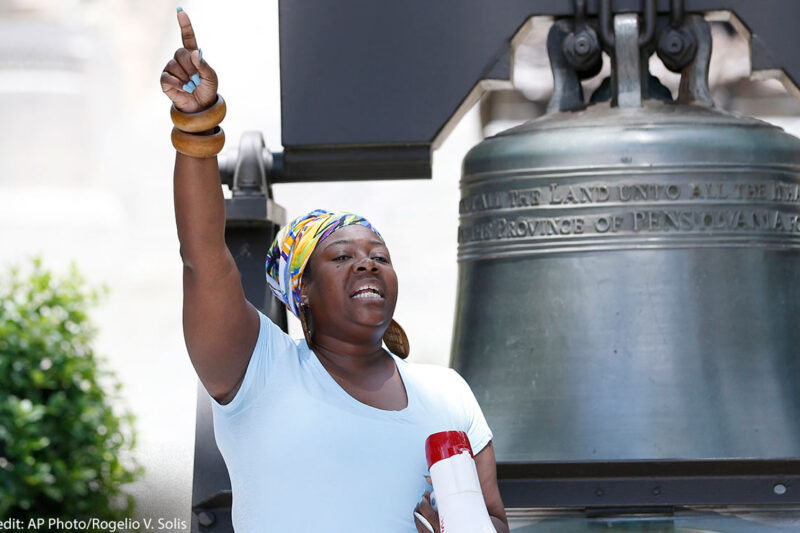The Trump Administration's Attack on Abortion Access Disproportionately Harms Communities of Color Already Devastated by COVID-19


Six months into the COVID-19 pandemic, it is devastatingly apparent that the United States’ longstanding racial inequalities have only been amplified during this crisis. Nowhere is that truer than in health care, including reproductive health care.
Even before the pandemic, people of color faced severe barriers to accessing essential reproductive health care as a result of interrelated factors such as structural racism, gendered oppression, and associated economic disparities. Abortion restrictions, such as bans on insurance coverage for abortion or laws mandating delays in abortion care and an extra unnecessary trip to the clinic, have a disproportionate impact on women of color. And Black women are still over to die from pregnancy or childbirth than white women. These inequalities, historically rooted in white supremacy, have deadly consequences.
During a global pandemic that is disproportionately killing people of color, restrictions on reproductive health care — like the FDA’s requirement that patients seeking medication abortion care travel in person to a health center for the sole purpose of picking up a pill and signing a form — hold even graver consequences for these communities.
In May, we sued over this very requirement on behalf of a coalition of medical experts and reproductive justice advocates, arguing that it is an unconstitutional restriction on abortion access and places people, particularly people of color, at serious risk during the pandemic by requiring medically unnecessary travel and in-person interactions that needlessly increase exposure risks.
In a tremendous victory for people who need abortion care, we won: A federal district court ruled that the FDA must suspend enforcement of this requirement for the duration of the public health emergency. But the Trump administration is not giving up the fight; undeterred by their failed attempts to defend this restriction in the lower courts, they have now taken the extraordinary step of asking the Supreme Court to step in.
There’s no question that the FDA’s policy — and the Trump administration’s insistence on reinstating it — is a direct attack on the health and safety of people of color. Sixty percent of people who receive abortion care are people of color, including 53 percent who identify as Black or Latinx. , people of color are suffering higher rates of severe illness and death from COVID-19 than white people, both because they experience higher rates of preexisting medical conditions that increase the severity of COVID-19, and because they are less likely to have access to quality care. As a result, the FDA’s requirement is particularly dangerous for people of color. And the nature of COVID-19 spread means that these hazards affect not only the individuals seeking care, but also their families and communities.
The Trump administration is well aware of the requirement’s disproportionate effect on communities of color. In fact, the court’s decision specifically found that “abortion patients face particular challenges in traveling … for in-person appointments during the pandemic, many of which arise because 60 percent of women obtaining abortion care are people of color and 75 percent are poor or low-income … By causing certain patients to decide between forgoing or substantially delaying abortion care, or risking exposure to COVID-19 for themselves, their children, and family members, the … requirement presents a serious burden.”
Should the Supreme Court grant the Trump administration’s request to reinstate the FDA’s rule, patients of color will again be forced to run a gauntlet of needless COVID-19 exposure risks — sharing a bus or train with others; dropping their children off for childcare — as the price of obtaining essential health care.
In our lawsuit, health care providers across the country shared stories about how the FDA requirement has harmed their patients during the pandemic.
The chair of the OB-GYN department at the University of New Mexico School of Medicine described the pandemic’s destructive impact on Native Americans in her state, who comprise roughly 11 percent of New Mexico’s population but represented half of all COVID-19 deaths by mid-May. She recounted a story of a Native patient who had to drive several hours from the patient’s community to her practice simply to comply with the FDA’s requirement. In the midst of a pandemic devastating Native communities, this patient was forced to risk COVID-19 exposure for herself, her community, and health center staff instead of safely receiving her prescription by mail.
When the pandemic forced medical offices to close, another doctor in New York City, who provides care through a community-based family health center, had to entirely cease providing abortion care to her patients, almost all of whom are people of color. She was able to provide other care through telemedicine but, because of the FDA’s in-person pill pick-up requirement, had to deny care to patients seeking medication abortion simply because she did not have access to a physical office where the patient could be handed the medication.
This is the message we hear from reproductive justice organizations, like our client SisterSong Women of Color Reproductive Justice Collective: Just as the harms of severe illness due to the COVID-19 pandemic are not shared equally, neither are the burdens of the FDA’s restrictions on medication abortion care.
The FDA’s restriction creates indefensible barriers to accessing abortion care with potential life or death consequences, particularly for people of color. We’re doing everything we can to stop that.

